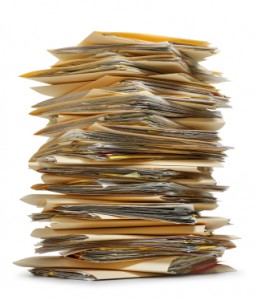 As a researcher, I most enjoy looking through collections of personal papers. For me, seeing what items still exist is just as interesting as finding the data they contain. I have gone through family papers that I was told were “junk” and found information that I would have never found elsewhere, and which only exists because someone thought it was important enough to keep. It was when pondering my family papers and the records I create in my own research that I began to think about future genealogists.
As a researcher, I most enjoy looking through collections of personal papers. For me, seeing what items still exist is just as interesting as finding the data they contain. I have gone through family papers that I was told were “junk” and found information that I would have never found elsewhere, and which only exists because someone thought it was important enough to keep. It was when pondering my family papers and the records I create in my own research that I began to think about future genealogists.
I would be willing to bet that most people have hard drives from old computers and no idea what is on them. In the process of moving files from an old computer to a new one, they took what they thought was necessary and saved it, thinking of the original hard drive as a last resort if old files needed retrieving. But in the future the problem becomes accessing that information. Files can no longer be opened because no one knows what programs created them, files get corrupted, and people don’t stick to naming conventions. I once named a second draft of a paper I wrote for graduate school “Part deux” because I was making major changes and wanted to refer back to some of my phrasing from the first draft. At that moment I was only working on one paper and I knew what it was, but now without opening the file I could not tell you what class that paper was for or what it contained. Is it because of the ease with which we can create electronic records that we don’t pay attention to the preservation of our own personal records?
Other digital records that future genealogists may have to deal with will be kept on social media platforms. According to Twitter, they currently have 271 million active monthly users who send 500 million tweets per day creating records of their lives and experiences. Currently the Library of Congress is archiving all of the public tweets and in a paper the library published in January 2013 they said that executing a search of the available tweets (2006–2010) could take up to 24 hours. For future genealogists, will they be missing a part of their ancestors’ lives because of the number of records that may have to be searched? Are these 140 character records going to matter to genealogists, or are they more useful for a broader study of society? How will future genealogists connect actual people to their online personae with any certainty?
Just imagine the loss of information that would have occurred if William Aspinwall had kept all of his notarial records in a file format that was no longer supported or the files had become corrupted. Or if some of the journals from the founding of the Massachusetts Bay Colony were kept as online journals under aliases, with no way of identifying the writers. With personal records becoming increasingly digital, are future genealogists going to be missing out on things that are important to understanding their ancestors’ lives?
Share this:
About Jason Amos
Jason received his bachelor’s degree from the University of Connecticut and his Master of Science from Simmons College’s Graduate School of Library and Information Science, focusing in archival management. He also received a certificate in Genealogical Research from Boston University. Jason began at NEHGS as a volunteer and then as an intern with the R. Stanton Avery Special Collections before moving into Research Services. Jason enjoys writing narrative reports and searching for every piece of information relating to an ancestor that helps reveal what their life was like.View all posts by Jason Amos →